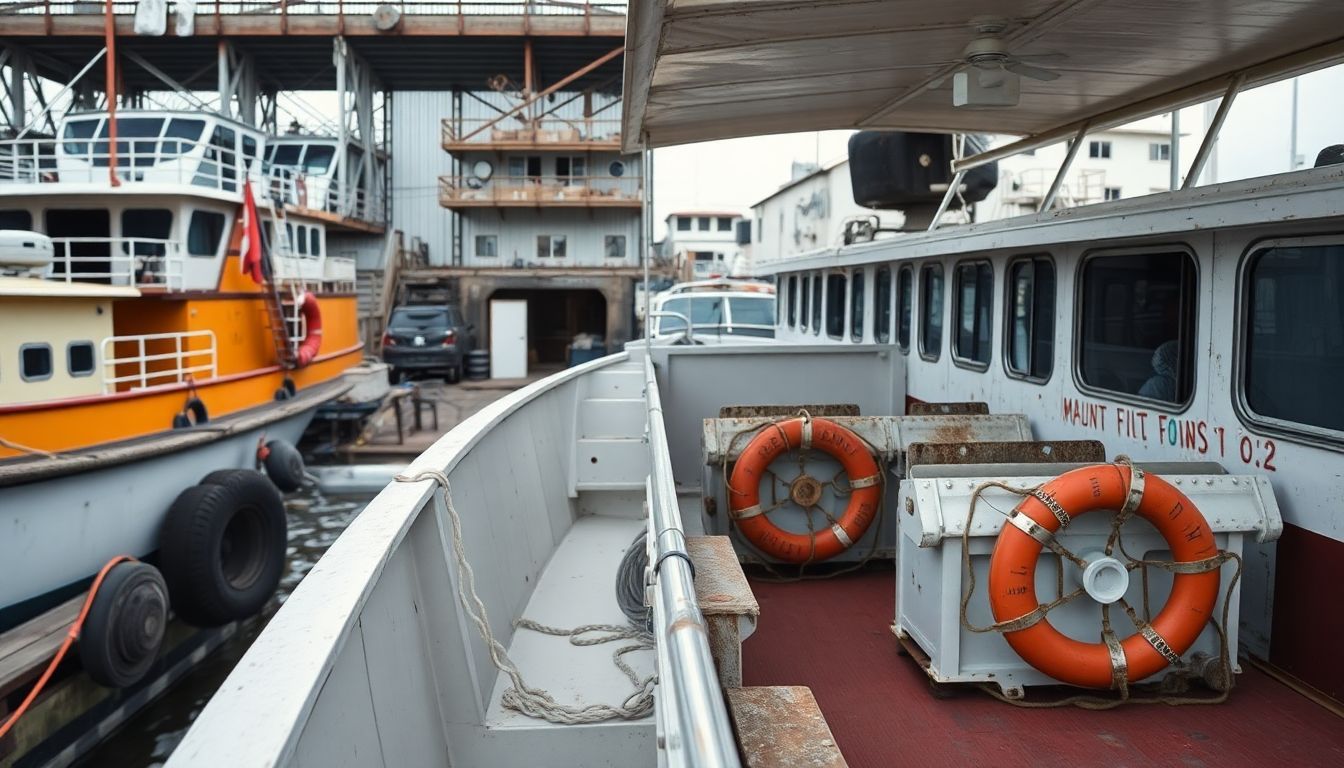Tour boat accidents can leave victims confused about their legal rights. Each year, hundreds of boating accidents occur in U.S. waters. This article will explain your legal options after a tour boat accident.
We’ll cover key steps to protect your rights and seek fair compensation.
Key Takeaways
- Tour boat accidents often stem from preventable issues like lack of proper inspections, unlicensed crew, poor maintenance, and equipment failures.
- Victims should take immediate steps after an accident, including checking for injuries, documenting the scene, gathering witness information, and reporting the incident to authorities.
- Filing an insurance claim promptly and providing accurate details about the accident, injuries, and losses is crucial for seeking compensation.
- Proving negligence in tour boat accidents requires showing the operator failed to ensure passenger safety, breached their duty of care, and directly caused harm.
- Victims have legal options including filing a lawsuit, but must act within time limits that vary by location and type of claim, often ranging from 6 months to 4 years.
Common Causes of Tour Boat Accidents

Tour boat accidents often stem from preventable issues. Lack of proper United States Coast Guard (USCG) inspections and certifications tops the list of common causes. Unlicensed crew members and poor boat maintenance also contribute to these incidents.
Equipment failures, such as malfunctioning navigation systems or life-saving gear, pose serious risks to passengers.
Improper operation of the vessel by crew members is another major factor. This problem often links to inadequate training, leading to errors in judgment during critical situations.
Maritime accidents can result from a mix of these issues, highlighting the need for strict adherence to safety regulations.
Safety doesn’t happen by accident. – Author Unknown
The next section will explore the immediate steps to take after a tour boat accident occurs.
Immediate Steps to Take After a Tour Boat Accident
Tour boat accidents can happen unexpectedly, leaving passengers in shock and confusion. Taking swift action is crucial to ensure safety and protect your legal rights.
- Check for injuries: Assess yourself and others for any injuries. Offer first aid if needed and call for emergency medical help.
- Move to safety: If possible, move to a safe area on the boat or evacuate if instructed by crew members.
- Account for all passengers: Help crew members count and locate all passengers, including those who may have fallen overboard.
- Document the scene: Take photos and videos of the accident scene, damages, and any visible injuries.
- Gather information: Collect names and contact details of other passengers, crew members, and witnesses.
- Report the accident: Notify the Coast Guard or local authorities if the accident caused serious injuries, fatalities, or property damage over $2,000.
- Seek medical attention: Even if you feel fine, get a medical check-up to rule out hidden injuries or delayed symptoms.
- Preserve evidence: Keep any torn clothing, damaged personal items, or other physical evidence from the accident.
- Contact your insurance company: Inform your insurance provider about the incident as soon as possible.
- Consult a maritime attorney: Speak with a lawyer experienced in boat accident cases to understand your legal options and rights.
Reporting the Accident
After taking immediate steps following a tour boat accident, reporting the incident is crucial. Proper documentation and notification can significantly impact your legal options. Here’s a guide to reporting a tour boat accident:
- Contact local marine law enforcement or the Coast Guard immediately. This step ensures official documentation of the incident and prompt assistance if needed.
- Document all injuries sustained during the accident. Take photos of visible injuries and seek medical attention, even for minor issues.
- Capture the accident scene thoroughly. Use your phone to take pictures and videos of the boat, surrounding area, and any visible damage.
- Collect contact information from witnesses. Ask for their names, phone numbers, and addresses for future reference.
- Exchange details with other involved parties. Get names, addresses, phone numbers, and insurance information from other boat operators or passengers.
- Record damaged items before repairs. Take photos and notes of all property damage for insurance claims and legal purposes.
- File an insurance claim promptly. Contact your insurance provider as soon as possible and provide all necessary documentation.
- Notify the Coast Guard about the maritime accident. This step is essential for official records and potential investigations.
- Gather written statements from witnesses. Ask them to describe what they saw in their own words while the event is fresh in their minds.
- Keep a detailed personal account of the incident. Write down your recollection of events, including weather conditions and any safety measures in place.
Filing an Insurance Claim
Filing an insurance claim after a tour boat accident is a crucial step. This process helps victims seek compensation for injuries and damages.
- Contact your insurance company right away. Report the accident and ask about the claim filing process.
- Gather all necessary documents. Include medical records, police reports, and photos of injuries or damages.
- Fill out the claim form carefully. Provide accurate details about the accident, injuries, and losses.
- Submit the claim with supporting evidence. Send all documents to your insurance company promptly.
- Keep a record of all communications. Note dates, times, and names of people you speak with about your claim.
- Follow up regularly on your claim status. Ask for updates and provide any extra information if needed.
- Review the settlement offer closely. Make sure it covers all your expenses and losses before accepting.
- Seek legal help if needed. An attorney with boat accident expertise can guide you through complex claims.
- Document all injury-related expenses. Save receipts for medical bills, travel costs, and lost wages.
- Be honest and thorough in all statements. False information can lead to claim denial or legal issues.
Types of Compensation Available
Tour boat accident victims can seek various types of compensation. Medical expenses often top the list, covering both immediate and long-term care needs. This includes emergency treatment, hospital stays, and ongoing rehabilitation costs.
Lost wages form another key area, accounting for income missed during recovery time. Victims may also claim for future earnings if the accident impacts their ability to work long-term.
Property damage is another important aspect of compensation. This covers repair or replacement costs for personal items damaged in the accident. Some cases may allow for additional compensation, such as pain and suffering or emotional distress.
The next section will explore how to prove negligence in tour boat accidents, a crucial step in securing fair compensation.
Proving Negligence in Tour Boat Accidents
Proving negligence in tour boat accidents requires clear evidence of careless actions. Victims must show that the boat operator failed to act responsibly, causing harm. This involves proving four key elements: duty of care, breach of duty, causation, and damages.
Boat operators have a legal duty to ensure passenger safety and follow maritime rules. If they ignore safety protocols or operate recklessly, they breach this duty.
Direct links between the operator’s actions and the accident must be established. For example, speeding in rough waters could lead to passenger injuries. Comparative negligence may apply if multiple parties share fault.
Passengers who ignore safety instructions might bear partial responsibility. Evidence like witness statements, accident reports, and expert testimony can strengthen a negligence claim.
Understanding these factors helps victims build a strong case for compensation.
Steps to File a Tour Boat Accident Lawsuit
After proving negligence, victims may need to file a lawsuit for fair compensation. The steps to file a tour boat accident lawsuit involve careful planning and legal expertise.
- Gather evidence: Collect photos, witness statements, medical records, and accident reports.
- Contact a maritime attorney: Find a lawyer with experience in tour boat accident cases.
- File a complaint: Your lawyer will draft and submit a legal document outlining your case to the court.
- Serve the defendant: Formally notify the responsible party of the lawsuit against them.
- Discovery phase: Exchange information with the defendant’s legal team through documents and depositions.
- Negotiate settlement: Attempt to reach an agreement before trial to avoid court costs.
- Prepare for trial: If settlement fails, your lawyer will ready your case for court presentation.
- Attend trial: Present your case before a judge or jury for a final decision.
- Appeal if needed: If the outcome is unfavorable, you may have the option to appeal the decision.
- Collect damages: If you win, work with your lawyer to ensure you receive the awarded compensation.
Supplementary Legal Insights
Legal cases often involve complex issues beyond basic claims. Experts can guide you through alternative dispute resolution, time limits for lawsuits, and product liability concerns.
Alternative Dispute Resolution: Mediation vs. Arbitration
Alternative Dispute Resolution (ADR) offers ways to settle disputes without going to court. Mediation and arbitration are two main ADR methods. In mediation, a neutral third party helps people talk and find a solution they both like.
Arbitration is more formal. An arbitrator listens to both sides and makes a binding decision.
Mediation gives people more control over the outcome. It’s less confrontational than arbitration. Arbitration results in a final, enforceable decision. Both methods can save time and money compared to lawsuits.
Choosing the right ADR method depends on the specific case and goals. The next section will explore the statute of limitations for boat accident lawsuits.
Statute of Limitations for Boat Accident Lawsuits
Legal deadlines for boat accident lawsuits vary based on the type of claim and location. In Florida, victims have four years to file personal injury claims from boating accidents. Wrongful death claims must be filed within two years, sometimes reduced to eighteen months.
Cruise ship accidents have stricter time limits, often just one year or even six months. Missing these deadlines can result in case dismissal and loss of compensation rights.
I’ve seen firsthand how crucial these time limits are. A client once waited too long to file a claim after a tour boat accident, thinking they had more time. Sadly, they lost their chance for compensation.
It’s vital to act quickly and consult a maritime lawyer soon after a boat accident to protect your legal rights.
Can Defective Products Be Grounds for a Lawsuit?
Defective products on tour boats can lead to serious accidents and injuries. Faulty engines, broken safety gear, or flawed life jackets may cause harm to passengers. In these cases, victims can file product liability lawsuits against manufacturers or distributors.
These legal actions aim to get money for medical bills and other costs from injuries. Product liability laws protect consumers from dangerous items and hold companies responsible for their products’ safety.
Victims must prove the product was defective and caused their injury to win a lawsuit. They need to show the item was used as intended and not altered. Evidence like expert reports, witness statements, and medical records can support their case.
A skilled maritime lawyer can help gather this proof and guide victims through the legal process. They can also explain the time limits for filing these types of lawsuits in different states.
Choosing the Right Maritime Attorney
Picking the right maritime attorney is crucial for your case’s success. Look for a lawyer who knows the Jones Act and federal maritime laws thoroughly. Many top maritime lawyers work on a contingency basis, so you don’t pay unless you win.
Ask about their track record with cases like yours, especially if you’ve had a serious injury such as spinal surgery or brain trauma. A skilled maritime attorney will fight for your rights and help you get fair compensation.
I once worked with a maritime lawyer who secured a large settlement for a client injured on a cruise ship. The attorney’s deep knowledge of maritime law and experience with similar cases made all the difference.
He knew exactly how to prove negligence and negotiate with the cruise line’s legal team. This direct experience showed me how vital it is to choose a competent maritime law expert for your case.
Conclusion
Tour boat accidents can lead to serious injuries and legal challenges. Victims have several options to seek justice and compensation. Quick action, detailed documentation, and skilled legal guidance are key to a successful claim.
Maritime attorneys specialize in these intricate cases and can help guide you through the legal process. Your rights and safety are important, so consider exploring your legal options after a tour boat accident.
For more information on how to hold negligent parties accountable in different scenarios, read our detailed guide on playground injuries and legal accountability.
FAQs
1. What legal rights do I have after a tour boat accident?
You have the right to seek compensation for injuries, lost wages, and medical bills. Maritime laws protect passengers on tour boats. A lawyer can help you understand your options and file a claim against responsible parties.
2. How long do I have to file a lawsuit after a tour boat accident?
The time limit to file a lawsuit varies by state and situation. Generally, you have one to three years from the accident date. Act quickly to preserve evidence and meet legal deadlines. Consult a maritime attorney to learn the specific time limits for your case.
3. Who can be held liable for a tour boat accident?
Several parties may be responsible, including the boat operator, tour company, or equipment manufacturers. Liability depends on the accident’s cause, such as operator error, poor maintenance, or faulty equipment. A thorough investigation will determine who is at fault.
4. What types of compensation can I receive for a tour boat accident?
You may be entitled to compensation for medical expenses, lost income, pain and suffering, and emotional distress. In severe cases, you might receive damages for long-term care or disability. An experienced attorney can help you pursue the full amount you deserve.
References
- https://www.maritimeinjurycenter.com/accidents-and-injuries/tour-boat/ (2024-09-16)
- https://rhhk.com/what-to-do-after-a-boating-accident-a-step-by-step-guide/ (2024-10-30)
- https://www.inpaincallwayne.com/legal-steps-to-take-after-a-boating-accident/ (2024-07-17)
- https://costaivone.com/legal-options-aware-following-boat-accident/
- https://www.mjjlawfirm.com/blog/2024/august/can-i-receive-compensation-for-a-boating-acciden/
- https://mikeserranolaw.com/2024/09/26/exploring-negligence-how-is-liability-determined-in-boat-accident-cases/
- https://www.findlaw.com/injury/torts-and-personal-injuries/recreational-boat-accidents-and-liability.html (2023-08-16)
- https://egenberg.com/2024/08/31/i-was-hurt-on-a-tour-boat-what-are-my-options/
- https://hhjtrialattorneys.com/mediation-vs-arbitration/ (2023-10-25)
- https://www.rivkindlaw.com/statute-limitations-boating-accident-lawsuit-fl/
- https://expresslegalfunding.com/boating-accident/ (2024-11-24)
- https://www.flahavanlaw.com/navigating-boating-accident-statistics-insights-and-safety-measures
- https://www.sneedmitchell.com/post/choosing-the-best-maritime-injury-lawyer-tips-and-insight

